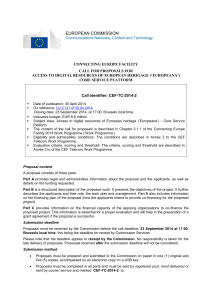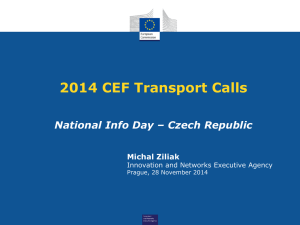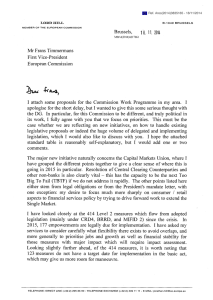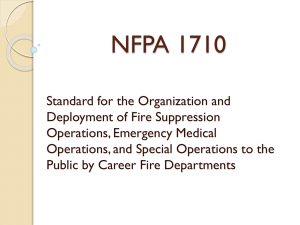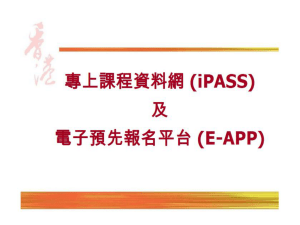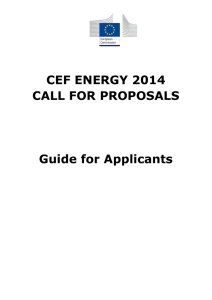E 1. Adequa competi investm private by the m projects financin In
advertisement
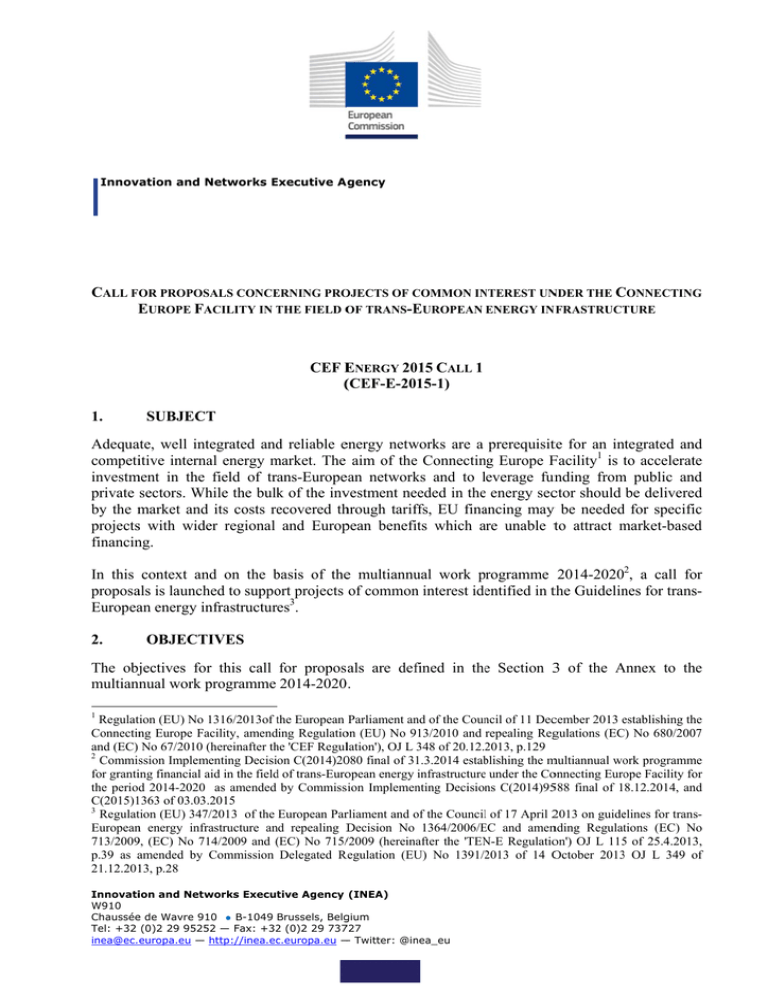
vation and Networks N Executive E A Agency Innov CALL FOR PROPOSSALS CONCE ERNING PRO OJECTS OF COMMON C IN NTEREST UN NDER THE CONNECTING G EUROPE FACILITY A IN THE T FIELD O OF TRANS-E EUROPEAN ENERGY IN NFRASTRUCT TURE CEF E NERGY 20 015 CALL 1 ((CEF-E-2015-1) 1. SUBJECT T Adequaate, well inttegrated and d reliable eenergy netw works are a prerequisitte for an in ntegrated annd competiitive internaal energy market. m The aim of thee Connectin ng Europe FFacility1 is to t acceleratte investm ment in the field of trans-Europeean network ks and to leverage l fun unding from m public annd private sectors. Whhile the bulk k of the invvestment neeeded in thee energy secctor should be delivereed by the m market andd its costs reecovered thhrough tarifffs, EU finaancing mayy be needed d for specifiic projectss with wideer regional and Europpean benefiits which are a unable tto attract market-base m ed financinng. b of thee multiannu ual work programme 2014-20202, a call foor In this context annd on the basis ort projects of common n interest ideentified in tthe Guidelin nes for transsproposaals is launchhed to suppo Europeaan energy innfrastructures3. 2. OBJECTIVES The objjectives forr this call for propossals are deffined in thee Section 3 of the Annex A to thhe multiannnual work programme p 2014-20200. 1 Regulattion (EU) No 1316/2013of the t European Parliament an nd of the Coun ncil of 11 Deccember 2013 establishing e thhe Connectinng Europe Faacility, amend ding Regulatioon (EU) No 913/2010 and repealing Reggulations (EC C) No 680/20007 and (EC) No 67/2010 (hereinafter ( th he 'CEF Regullation'), OJ L 348 of 20.12.2 2013, p.129 2 Commission Implem menting Decision C(2014)20080 final of 31.3.2014 estab blishing the m multiannual wo ork programm me for grantiing financial aid a in the field d of trans-Euroopean energy infrastructuree under the Coonnecting Euro ope Facility foor the period 2014-2020 as amended by Commisssion Implemen nting Decision ns C(2014)95588 final of 18.12.2014, annd C(2015)11363 of 03.03..2015 3 Regulattion (EU) 347/2013 of the European Parrliament and of o the Councill of 17 April 22013 on guideelines for transEuropeann energy infrrastructure an nd repealing D Decision No 1364/2006/E EC and amennding Regulattions (EC) No N 713/20099, (EC) No 7114/2009 and (EC) ( No 715//2009 (hereinafter the 'TEN N-E Regulatioon') OJ L 115 5 of 25.4.20133, p.39 as aamended by Commission Delegated R Regulation (EU U) No 1391/2 2013 of 14 O October 2013 3 OJ L 349 of o 21.12.20113, p.28 Innovatiion and Netw works Executtive Agency (INEA) W910 Chaussée e de Wavre 91 10 B-1049 Brussels, Belg gium Tel: +32 (0)2 29 9525 52 — Fax: +32 2 (0)2 29 737 727 inea@ec.europa.eu — http://inea.ec c.europa.eu — Twitter: @in nea_eu 3. PRIORITIES The priorities of this call for proposals are defined in Section 4 of the Annex to the multiannual work programme 2014-2020. 4. INDICATIVE BUDGET The indicative amount to be allocated on the basis of this call for proposals to projects of common interest in the field of trans-European energy infrastructure is €100 million. 5. TIMETABLE Date of publication of call for proposals Deadline for the submission of proposals 4 March 2015 29 April 2015 (17:00 Brussels time) Evaluation of proposals May-June 2015 (indicative) Consultation Committee; Parliament of CEF Coordination July 2015 (indicative) information of European Adoption of the Selection Decision Signature of individual grant Agreements 6. July 2015 (indicative) As from October 2015 (indicative) EXPECTED RESULTS FROM THE FINANCIAL ASSISTANCE The results expected under this call are defined in Section 6 of the Annex to the multi-annual work programme 2014-2020. 7. PROCEDURE FOR SUBMISSION OF PROPOSALS Practical information on this call for proposals and the evaluation process is detailed in the Guide for Applicants, which is available together with the application forms and other relevant documents on the website of the Innovation and Networks Executive Agency (INEA): http://inea.ec.europa.eu/en/cef/cef_energy/apply_for_funding/cef_energy_calls_for_proposals_20 15.htm. Applicants are invited to carefully read all call-related documents, including the instructions given in the Guide for Applicants. 7.1. Application forms Proposals must be submitted using the application forms provided on the call website at the link above. Where possible, applicants are strongly encouraged to submit joint applications for actions relating to the same project of common interest. Proposals must be signed by the applicant(s) or his duly authorized representative and must be perfectly legible so that there can be no doubt as to words and figures. -2- The applicant(s) specified in the application form part A will automatically be considered as the beneficiary(ies) if the proposal is selected for funding. If applicants designate affiliated entities within the meaning of Article 122 of the Financial Regulation4 to support the implementation of the submitted action, the information on these affiliated entities must be encoded in the application form part A, and any relevant supporting documents must be provided. 7.2. Submission of proposals Applicants are strongly encouraged to submit their applications in English. Proposals must be submitted electronically using the TENtec eSubmission module at the latest on 29 April 2015 at 17:00 Brussels time (see also section 9 on admissibility conditions). Application form part A is automatically generated by the eSubmission module. Application forms parts B, C and D must be downloaded from the call website at the link above and have to be duly filled in. Once final they must be uploaded into the TENtec eSubmission module. The same applies to any annexes or supporting documents accompanying the proposal. Any parts of the application form that require signatures of applicants or relevant authorities must be scanned and uploaded into the TENtec eSubmission module. Applicants must be able to provide the original documents and send them to the Commission/ Agency services upon request. 8. COMMUNICATION ON THE CALL FOR PROPOSALS Further information or clarifications concerning this call for proposals will be published on the call website at the following link: http://inea.ec.europa.eu/en/cef/cef_energy/apply_for_funding/cef_energy_calls_for_proposals_20 15.htm. Applicants are invited to regularly consult this website until the deadline for submission of proposals. Any additional specific questions related to this call may be addressed to the email of the call helpdesk: INEA-CEF-Energy-calls-@ec.europa.eu. The answers to questions submitted will be published in the FAQ list on the call website, in order to ensure equal treatment of all potential applicants. Questions related to the call should be submitted at the latest by 14 April 2015 to ensure sufficient time for the last update of the FAQs by 22 April 2015. Questions which are specific to a particular proposal and where the answer would provide a comparative advantage to the applicant will not be answered. Please note that proposals must not be sent to the helpdesk email address. 4 Regulation (EU, EURATOM) No 966/2012 of the European Parliament and of the Council of 25 October 2013 on the financial rules applicable to the general budget of the Union and repealing Council Regulation (EC, Euratom) No 1605/2002, OJ L 298 of 26.10.2012, p.1 -3- 9. ADMISSIBILITY CONDITIONS A proposal will not be evaluated if at least one of the following situations occurs: It is not submitted electronically in the TENtec Information System eSubmission module. It is submitted after the deadline for submission of proposals (see sections 5 'Timetable' and 7.2 'Submission of proposals'). The proposal is incomplete, i.e. any form A, B, C or D is missing. The proposal is not duly signed by the applicant(s). In this respect, proposals or part(s) of proposals submitted by email will not be accepted. 10. ELIGIBILITY CRITERIA 10.1. Eligible applicants Pursuant to Article 9 of the CEF Regulation, only those proposals submitted by one of the following types of applicants are eligible: One or more Member States; With the agreement of the Member States concerned, international organisations, joint undertakings, or public or private undertakings or bodies established in Member States. Proposals may be submitted by entities which do not have legal personality under the applicable national law, provided that their representatives have the capacity to undertake legal obligations on their behalf and offer guarantee for the protection of the Union's financial interests equivalent to that offered by legal persons. Such applicants are therefore requested to provide their statutes or relevant abstracts in the application. Proposals submitted by natural persons shall not be eligible. Any applicant that cannot provide the agreement of the Member State concerned shall not be eligible. Where necessary to achieve the objectives of a given project of common interest and where duly motivated, third countries and entities established in third countries may participate in actions contributing to the projects of common interest. They may not receive funding under this call for proposals except where it is indispensable to achieve the objectives of a given project of common interest. Applications presented by third countries and entities established in third countries must contain the agreement of the Member State concerned by the proposed Action, a letter of support from the European partner involved in the project of common interest to which the proposal relates, as well as a declaration on why the participation of the applicant is indispensable. Applicants that are entities established in a third country must also provide proof of the support of the third country authorities concerned. -4- Applicants may designate affiliated entities within the meaning of Article 122 of the Financial Regulation, for the purpose of supporting the implementation of the action submitted for funding. Such affiliated entities shall comply with the eligibility criteria for applicants. For multi-applicant proposals, it is recommended that an applicant is designated to coordinate the application. 10.2. Exclusion criteria In line with Articles 106 to 108 and 131 of the Financial Regulation and Article 141 of the Rules of Application5, applicants will be excluded from participating in the call for proposals procedure if they are in any of the following situations: i. they are bankrupt or being wound up, are having their affairs administered by the courts, have entered into an arrangement with creditors, have suspended business activities, are the subject of proceedings concerning those matters, or are in any analogous situation arising from a similar procedure provided for in national legislation or regulations; ii. they or persons having powers of representation, decision-making or control over them have been convicted of an offence concerning their professional conduct by a judgment of a competent authority of a Member State which has the force of res judicata; iii. they have been guilty of grave professional misconduct proven by any means which the contracting authority can justify including by decisions of the EIB and international organisations; iv. they are not in compliance with their obligations relating to the payment of social security contributions or the payment of taxes in accordance with the legal provisions of the country in which they are established or with those of the country of the contracting authority or those of the country where the contract is to be performed; v. they or persons having powers of representation, decision-making or control over them have been the subject of a judgment which has the force of res judicata for fraud, corruption, involvement in a criminal organisation, money laundering or any other illegal activity, where such illegal activity is detrimental to the Union’s financial interests; vi. they are subject to a financial or administrative penalty referred to in Article 109(1) of the Financial Regulation. The cases referred to in point (v) above cover: 1) cases of fraud as referred to in Article 1 of the Convention on the protection of the EU financial interests established by the Council Act of 26 July 1995; 2) cases of corruption as referred to in Article 3 of the Convention on the fight against corruption involving officials of the European Union or officials of Member States of the European Union, established by the Council Act of 26 May 1997; 3) cases of participation in a criminal organisation, as defined in Article 2(1) of Joint Action 98/733/JHA of the Council; 4) cases of money laundering as defined in Article 1 of Council Directive 91/308/EEC. 5 Commission Delegated Regulation (EU) No 1268/2012 of 29 October 2012, OJ L 362, 31.12.2012, p. 1. -5- Applicants will not be granted financial assistance if, in the course of the grant award procedure: i. they are subject to a conflict of interests; ii. they are guilty of misrepresenting the information required by the contracting authority as a condition of participation in the grant award procedure or have failed to supply that information; iii. find themselves in one of the situations of exclusion, referred to above. The same exclusion criteria apply to affiliated entities. Applicants and their affiliated entities, if applicable, must certify that they are not in one of the situations listed above. 10.3. Eligible actions In line with Article 7 of the CEF Regulation, only actions contributing to projects of common interest as identified in the Commission Delegated Regulation No 1391/2013 of 14.10.2013 shall be eligible for support through Union financial aid in the form of grants. Pursuant to Article 14(1) of the TEN-E Regulation, projects of common interest falling under the categories set out in Annex II.1, 2 and 4 of the TEN-E Regulation are eligible for Union financial assistance in the form of grants for studies (and financial instruments). Pursuant to Articles 14(2), 14(3) of the TEN-E Regulation, projects of common interest falling under the categories set out in Annex II.1(a) to (d), 2 and 4 of the TEN-E Regulation, except for hydro-pumped electricity storage projects, are also eligible for Union financial assistance in the form of grants for works if they fulfil all of the following criteria: – the project specific cost-benefit analysis pursuant to Article 12(3)(a) provides evidence concerning the existence of significant positive externalities, such as security of supply, solidarity or innovation; – the project has received a cross-border cost allocation decision pursuant to Article 12; or, for projects of common interest falling under the category set out in Annex II.1(c) and that therefore do not receive a cross-border cost allocation decision, the project shall aim to provide services across borders, bring technological innovation and ensure the safety of cross-border grid operation; – the project is commercially not viable according to the business plan and other assessments carried out, notably by possible investors or creditors or the national regulatory authority. The decision on incentives and its justification referred to in Article 13(2) shall be taken into account when assessing the project’s commercial viability. Pursuant to Article 14(4) of the TEN-E Regulation, projects of common interest falling under the categories set out in Annex II.1(e) of the TEN-E Regulation, i.e. "smart grids", are also eligible for Union financial assistance in the form of grants for works, if the concerned project promoters can clearly demonstrate the significant positive externalities generated by the projects and their lack of commercial viability, according to the business plan and other assessments carried out, notably by possible investors or creditors or, where applicable, a national regulatory authority. -6- The proposals requesting grants for works which fail to provide the relevant supporting documents or that provide supporting documents that are not legally valid at the time of their submission shall not be eligible and will not be further evaluated. The contents of the supporting documents and whether the proposed Action demonstrates evidence concerning the existence of significant positive externalities, such as security of supply, solidarity or innovation; provides services across borders, brings technological innovation and ensures the safety of cross-border grid operation; or is commercially not viable will be assessed during the evaluation under the applicable award criteria. 11. SELECTION CRITERIA The selection criteria are detailed in Section 7.4 of the Annex to the multi-annual work programme 2014-2020. Where applicants designate affiliated entities within the meaning of Article 122 of the Financial Regulation, such affiliated entities shall comply with the selection criteria. The compliance of the affiliated entities with selection criteria will be checked only for the proposals selected for funding. The operational and financial capacity of applicants and designated affiliated entities will be assessed as specified below. 11.1. Financial capacity The applicants must have stable and sufficient sources of funding to maintain their activity throughout the period during which the action is being carried out and to participate in its funding. Together with the application, the applicants shall provide their financial statements certified by an external auditor for the last two financial years for which the accounts have been closed. If an applicant has been operating for less than two years, the financial statements may be replaced by a letter of support obtained from a third party (e.g. the applicant's parent company) or by another applicant of the proposed Action. These documents must be attached to the application. The requirement for applicants to demonstrate their financial capacity does not apply to Member States, third countries, public bodies established in the EU as well as transmission system operators certified following the procedures laid down in Articles 10 or 11 of Directive 2009/72/EC or Articles 10 or 11 of Directive 2009/73/EC. To this effect, the certified transmission system operators are requested to submit their valid certification decisions. 11.2. Operational capacity The applicants must have the operational and technical competencies and capacities required to complete the proposed Action for which the grant is awarded. They must provide appropriate documents attesting to that capacity (e.g. organisations' activity report, proof of the experience in carrying out infrastructure actions). Information submitted by applicants who have benefited/are benefiting from CEF Energy financial support as from 2014 may be taken into account in the evaluation of their operational capacity. -7- The requirement to demonstrate the operational capacity does not apply to Member States, third countries, public bodies established in the EU and transmission system operators certified following the procedures laid down in Articles 10 or 11 of Directive 2009/72/EC or Articles 10 or 11 of Directive 2009/73/EC. To this effect, the certified transmission system operators are requested to submit their valid certification decisions. 12. COMPLIANCE WITH UNION LAW In accordance with Article 23 of the CEF Regulation, only actions in conformity with Union law and which are in line with the relevant Union policies shall be financed, in particular those relating to competition, the protection of the environment, state aid and public procurement. 13. AWARD CRITERIA Only those proposals received in response to the call that comply with all the eligibility and selection criteria will be evaluated. Such proposals will be evaluated against the following award criteria taking into account the list of general orientation as stipulated in Article 17(5) and in Part V of the Annex I of the CEF Regulation. Each application is assessed against the award criteria on scale from 0 (very poor) to 5 (excellent), with the corresponding comments. Marks will be weighted as follows: The description of criterion 1 Maturity of the action with regards to the developmental stage of the project, based on the implementation plan (Article 5(1) of the TEN-E Regulation) Weight (proposals for works) Weight (proposals for studies) 20% 25% 10% 10% 15% NA Maturity refers to the specific status of preparation of the Action for which the funding is requested, in order to establish the capacity for their implementation in accordance with the foreseen time plan and technical specifications, as well as the state of readiness for commencement at short term of the proposed Action. Furthermore, the appropriateness of the proposed Action as the next step in the development of the PCI is also considered under this criterion. 2 Cross-border dimension of the action, area of impact and number of Member States involved in the action This criterion refers to the extent of the cross-border impact of the action, taking into consideration the area, the number of Member States positively impacted by the action,(as seen in relation to the geographical location of the action) and the level of cooperation between the involved countries. 3 Extent of the positive externality provided by the action involving works, impact of the action on solidarity -8- This criterion applies only to proposals for works and reflects the extent of the positive externalities provided by the PCI that go beyond its direct benefits. Positive externalities relate to macro-regional security of supply, solidarity between Member States or technological innovation. 4 Need to overcome financial obstacles 15% 15% 10% 10% 15% 20% 15% 20% This criterion refers to financial obstacles that impede the timely completion of the action and to how public funding would help to overcome this situation. 5 Soundness of the implementation plan proposed for the Action The criterion refers to the coherence between the proposed Action's objectives and planned resources/activities leading to the timely completion of the proposed Action, the appropriateness of the project management processes and risk control issues. . 6 Priority and urgency of the action, will the project remove bottlenecks, end energy isolation and contribute to the implementation of the internal energy market This criterion refers to the priority of the proposed Action and to the importance to start it urgently, in relation with its impact on removing bottlenecks, ending energy isolation and contributing to the implementation of the internal energy market taking also into account that due consideration should be given to electricity projects. 7 Stimulating effect of the CEF financial assistance on the completion of the action This criterion refers to how CEF funding will ensure/accelerate the implementation of the proposed Action. To be considered for funding, a proposal must reach a result for each criterion of at least 60% (at least 3 points before weighting is applied) of the maximum points foreseen per criterion. A ranking list of Actions proposed to receive CEF financial assistance will be established. 14. FINANCIAL PROVISIONS 14.1. General principles 14.1.1. Other sources of financing Pursuant to Article 129 of the Financial Regulation, no Union financial aid shall be awarded to actions receiving funds from other sources of EU financing. In no circumstances shall the same costs be financed twice by the Union budget. -9- In that respect any actions or part thereof that receive or have received Union funding under other EU Programmes (i.e. TEN-E, EEPR, EIPA, IPA, ESIF, FP7, Horizon 2020) will not be eligible. 14.1.2. Non-profit principle In accordance with Article 125 of the Financial Regulation, grants shall not have the purpose or effect of producing a profit within the framework of the action. Where a profit is made, the Commission shall be entitled to recover the percentage of the profit corresponding to the Union contribution to the eligible costs actually incurred by the beneficiary to carry out the action6. 14.1.3. Non-retroactivity Pursuant to Article 130 of the Financial Regulation, no grants may be awarded retrospectively for actions already completed. A grant may be awarded for an action which has already begun provided that the applicant(s) can demonstrate the need for starting the action prior to the signature of the grant agreement. 14.2. Funding form Grants to be awarded further to this call for proposals will take the form of reimbursement of a specified proportion of the eligible costs actually incurred. 14.2.1. Co-funding rates The maximum co-financing rates of EU financial assistance to be granted under this call for proposals are laid down in Article 10(3) of the CEF Regulation. The Commission reserves the right to award a grant of less than the amount requested by the applicant. 14.2.2. Eligible costs Eligible costs are costs actually incurred by the beneficiary of a grant which meet all the criteria laid down in Article 126(2) of the Financial Regulation. The same criteria apply to the costs incurred by affiliated entities and implementing bodies. The applicants' attention is drawn to points (3) to (8) of Article 8 of the CEF Regulation concerning the eligibility of costs. Costs shall be eligible at the earliest from the date on which an application for aid is lodged. Indirect costs, i.e. costs which are not identifiable as direct cost, but which have nevertheless incurred in connection with the implementation of the Action, are not eligible. In line with the first subparagraph of Article 8(7) of the CEF Regulation and Article 126(3)(c) of the Financial Regulation, VAT paid by beneficiaries of grants awarded following this call for proposals is eligible except: 6 In the meaning of Article 125 of the Financial Regulation, profit shall be defined as a surplus of the receipts over the eligible costs incurred by the beneficiary, when the request is made for payment of the balance. - 10 - deductible VAT (VAT paid by the beneficiary for the implementation of taxed activities or exempt activities with right of deduction); VAT paid for the implementation of activities engaged in as a public authority by the beneficiary where it is a Member State, regional or local government authority of a Member State or another body governed by public law of a Member State. Considering that beneficiaries that are public bodies of Member States are expected to carry out activities as public authorities (to exercise prerogatives of public powers), VAT paid by beneficiaries that are public bodies established in Member States is, in principle, ineligible. Detailed information on eligible and ineligible costs is included in the model grant agreement, which is available on the call website. 14.2.3. Payment arrangements For simple actions, a single pre-financing payment corresponding to 40% of the maximum grant amount awarded will be made within 30 days after the last party signs the grant agreement. No interim payment may be made. For complex actions, a first pre-financing payment corresponding to 40% of the first instalment of grant awarded as specified in the grant agreement will be transferred to the beneficiary within 30 days after the last party signs the grant agreement. Further pre-financing payments may be made upon request and in accordance with the financial needs of the action. Requests for interim payments must be submitted at least every two years. The cumulative amount of all pre-financing and interim payments shall not exceed 80% of the maximum amount of the financial aid awarded. As a rule, studies will be considered as simple actions and works will be considered as complex actions. However, studies with a total Union contribution to the eligible costs equal to or exceeding EUR 4 million and a planned duration of more than 3 years might be considered as complex actions if requested and justified by the applicant(s). In the event that the beneficiary's financial capacity is not satisfactory, the payment of prefinancing may be subject to the receipt of a financial guarantee for up to the same amount as the pre-financing payment to be made. The financial guarantee, in euro, shall be provided by an approved bank or financial institution established in one of the EU Member States. When the beneficiary is established in a third country, INEA may agree that a bank or financial institution established in that third country may provide the guarantee if it is considered that the bank or financial institution offers equivalent security and characteristics as those offered by a bank or financial institution established in a Member State. Amounts blocked in bank accounts shall not be accepted as financial guarantees. The guarantee may be replaced by a joint or several guarantees provided by third parties or by a joint guarantee of the beneficiaries of an action that are parties to the same grant agreement. The guarantee shall be released as the pre-financing is cleared against the interim and/or balance payment(s) made, in accordance with the conditions laid down in the grant agreement. - 11 - The final amount of the grant to be awarded to the beneficiary is established after completion of the action, upon approval of the request for payment including, where applicable, the supporting documents as described in the model grant agreement. For multi-beneficiary actions, it is strongly recommended that beneficiaries designate a coordinator and sign an internal cooperation agreement regarding their operation and coordination, including all internal aspects related to the management of the beneficiaries and the implementation of the action. 15. PROCESSING OF PERSONAL DATA Applicants' reply to the grant application involves the recording and processing of personal data (such as name, address and CV), which will be processed pursuant to Regulation (EC) No 45/2001 on the protection of individuals with regard to the processing of personal data by the Community institutions and bodies and on the free movement of such data. Unless indicated otherwise, applicant's replies to the questions in this form and any personal data requested are required to assess an applicant's grant application in accordance with the specifications of the call for proposals and will be processed solely for that purpose by the Innovation and Networks Executive Agency as data controller for this purpose. An applicant may, upon request, have his/her personal data sent to him/her and rectify any inaccurate or incomplete particulars. Should an applicant have any queries concerning the processing of his/ her personal data, please address them to the entity acting as data controller within INEA. The data subjects have the right of recourse at any time to the Data Protection Officer of the Executive Agency (INEA-DPO@ec.europa.eu) or in case of conflict with the Controller or data protection officer concerning the processing of his/her personal data, an applicant has the right to submit a complaint at any time directly to the European Data Protection Supervisor (www.edps.europa.eu). Details concerning the processing of an applicant's personal data are available on the privacy statement at the page: http://inea.ec.europa.eu/download/calls2014/cef_transport/privacy_statement.pdf. an applicant personal data (name, given name if natural person, address, legal form, registration number and name and given name of the persons with powers of representation, decision-making or control, if legal person) may be registered in the Early Warning System (EWS) only or both in the EWS and Central Exclusion Database (CED) by the Accounting Officer of the Commission, should the applicant be in one of the situations mentioned in: Commission Decision 2014/792/EU of 13 November 2014 on the Early Warning System to be used by the authorising officers of the Commission and by the executive agencies (OJ 2014 L 329 of 14 November, p.68) (for more information see http://ec.europa.eu/budget/explained/management/protecting/protect_en.cfm#SAP), or the Commission Regulation 2008/1302 of 17.12.2008 on the Central Exclusion Database (OJ L 344, 20.12.2008, p. 12) (for more information see the Privacy Statement on http://ec.europa.eu/budget/library/sound_fin_mgt/privacy_statement_ced_en.pdf. - 12 - Applicants are informed that, to ensure that the Union’s financial interests are protected, their personal data may be communicated to internal audit services, the European Commission, the European Court of Auditors, the body specialising in financial irregularities (Financial Irregularities Panel) or the European Anti-Fraud Office (OLAF). The data of applicants in any of the situations referred to in Articles 106(1), 107 and 109(2)(a) of the Financial Regulation may be included in a central exclusion database and communicated to designated persons in the Commission, the other institutions, agencies, authorities and bodies referred to in Article 108(1) and (2) of the Financial Regulation. This also applies to those with powers of representation, decision-making power or powers of control in respect of such applicants. Following a request to the Commission’s Accounting Officer, anyone registered in the database is entitled to be informed of the data recorded about them. 16. IMPORTANT DOCUMENTS In preparing an application, please ensure that all of the following documents, which are available on the call website, are referred to: Multi-annual work programme 2014-2020 as amended Guide for Applicants (as well as the TENtec eSubmission module User Manual) Application form (parts A, B, C and D) CEF Regulation TEN-E Regulation as amended Model grant Agreement - 13 -
